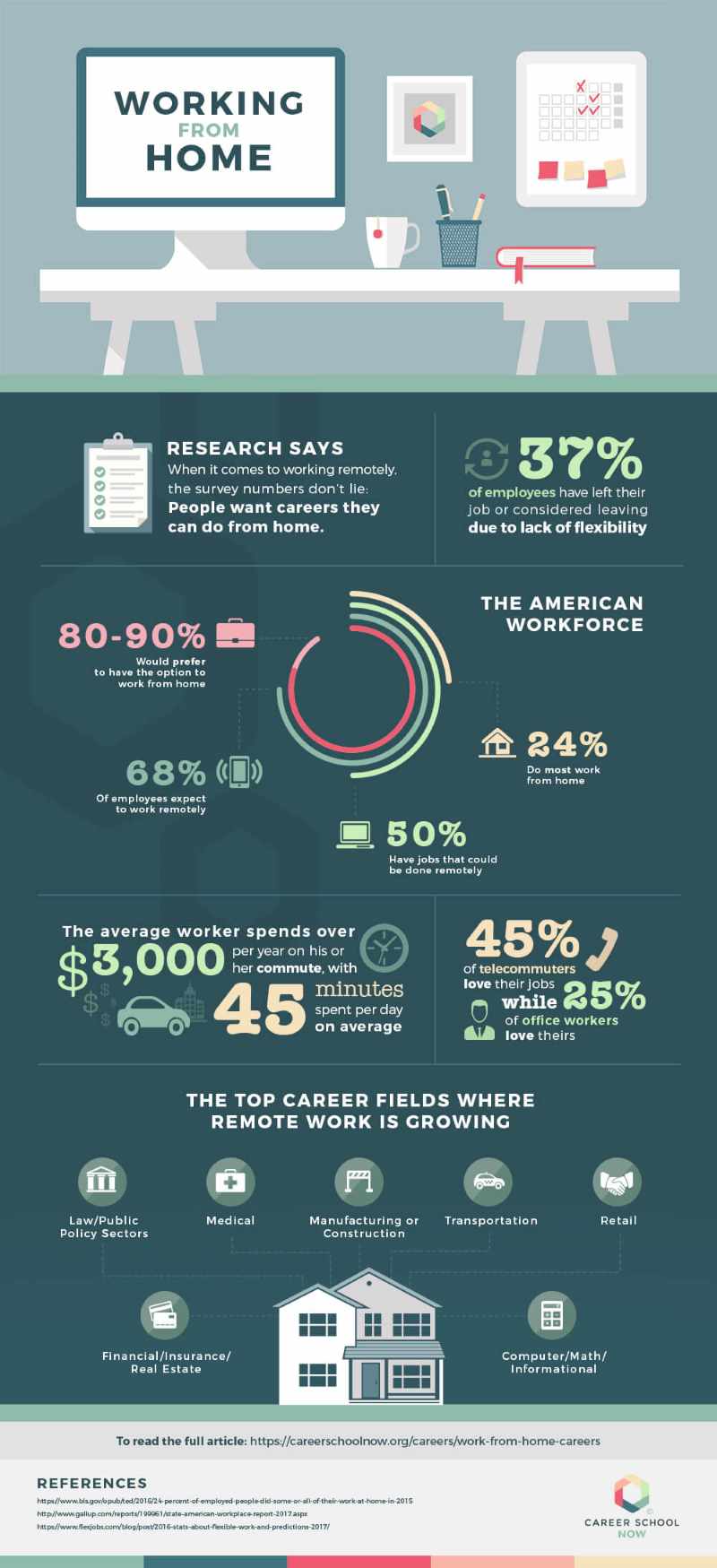
As we all now know, working remotely from your home, a coffee shop, or anywhere else with an internet connection is a legitimate option for many careers. Considering modern advances in technology, and increasing COVID variants, working from home has turned into more of a norm than not.
Long gone are the days where every employee needs to clock in at the company office every day. Remote employees have become part of business culture, expansion, and expectation. After all, we're living in a highly connected world—it makes sense that working arrangements have advanced alongside technology.
Whatever your reasons are for needing or wanting to work from home, there are a huge number of careers that support this option.
Work from Home Statistics

There are a plethora of studies done on the American workforce—everything from occupations, to job satisfaction, to salaries, to working remotely.
Their numbers don’t lie—people want and enjoy careers they can do from home.
Some of the figures from these surveys are so interesting that we’d be remiss not to share them with you.
- According to BLS, in 2021, 24 percent of all employees did most of their work from home, which is up from 19 percent just a few years ago.
- 50 percent of the workforce has a job that could be done mostly remote.
- Up to 90 percent of the workforce would prefer to have a work-from-home option, at least part of the time.
- Fortune 1000 companies across the world are starting to shift toward allowing a more remote workplace, and 50 to 60 percent of the time, their employees work from home.
- Almost half of all employed have considered leaving, or have actually left, their place of employment due to lack of flexibility.
- 25 percent of office workers reported loving their jobs, while 45 percent of telecommuters reported loving theirs.
- 63 percent of workers feel that the 40-hour work week will start becoming inconsequential.
- According to a Gallup poll, 74 percent of older Americans would work longer if they had a flexible work environment, and 34 percent would prefer to work from home.
- A survey through AfterCollege found that 68 percent of millennial job seekers are more interested in positions with a remote option.
- The top career fields where remote work is growing stronger are financial/insurance/real estate, transportation, manufacturing or construction, retail, healthcare, computer/informational/math, and law/public policy sectors.
Oh, and one last number for you. The average worker spends more than $3,000 per year on his or her work commute, with 45 minutes being the average time spent per day getting to and from the office.
Working from Home Positives
To work from home, you need to have a large amount of discipline. Learn to multitask during your breaks. Pour another cup of coffee, take the dog out, and put wet clothes in the dryer, all in five minutes! There has to be something to it, because nearly ¼ of all U.S. employees work predominantly to completely from home and enjoy these benefits:
- A Growing Savings Account: Working from home saves money. You won’t have to shell out for all that gas you’d use on your commute, clothing for work, going out to lunch, and the many other expenses that go along with working from an office. Working from home can save you a couple of hundred dollars monthly. Not to mention, you can write off part of your home and utilities as a work expense!
- Less Stress: According to Psychology Today’s research, commuters have a higher level of stress. Many feel their lives don’t hold as much meaning because of how much time they spend doing work-related things. Because working remotely can give you the sense that you aren’t being overworked, you are able to put more energy into other things that matter to you, above and beyond your job.
- Better Balance: People who have the option to work remotely find that they have better work-life balance. They are able to better nurture their relationships, as well.
- Higher Job Satisfaction: Sometimes, working for home for extended periods of time can make you appreciate the office even more. Also, many people who work from home are so grateful for the opportunity that it makes them love their jobs even more. We spend eight hours or more at work, so if you don’t love it, then it can eat away at you.
- Longer Productivity Cycles: Someone said that on average, a person is only productive three hours at a time. In an office setting, with meetings, chats with coworkers, and other office distractions, it could be even less.
- Travel is an Option: Working remotely means anywhere with internet access. So, you have more flexibility when it comes to traveling. Poolside with your laptop: doesn’t that sound awesome?
Possible Negatives of Working from Home
There’s no such thing as perfect; the same holds true for working at home. While there are many pleasures that can come from not working in an office environment, they still need to be weighed against things that make it less than ideal.
- It's Lonely: If you’re an introvert, then working remotely is the most perfect scenario. But if you’re more extroverted, then it can be the cause of a very lonely work day. The lack of interaction can have a negative impact on you.
- Work Never Ends: When you work at home, 9 to 5 is thrown out the window, unless you’re disciplined in sticking to your hours. But you know how you sometimes get an idea, or you realize you forgot to do something, and it’s 1 a.m.? That internet connection never sleeps, which means, neither might you.
- Separation From Teams: One big check in the “con” column is that working remotely may disconnect you from your team members. You may miss out on important details that happen throughout the workweek—and out of sight sometimes means out of mind, so you may never get filled in. You might be more productive and focused, but you do miss out on the necessary and oftentimes meaningful connections with coworkers.
- Distractions of a Different Kind: Sure, working in an office has its own set of distractions: chatty coworkers, Nerf gun wars, and meetings, to name just a few. But when you work from home, distractions get personal. Your phone blowing up with texts, because for some reason, your friends and family don’t understand when you tell them you actually do work when you’re home. Kids needing your attention. Dog needing a walk. And we already mentioned the dirty dishes and laundry.
- That Burn Out: For many, there comes a time during the day where you’re ready to crash face first on your desk. The great benefit of working in an office is there are others around you to keep you awake and hold each other accountable. Your colleagues can get burned out, chat their way through it, finish out their day, and go home.
List of Flexible Work from Home Careers
There are many really excellent paying jobs that can be done outside of a traditional work environment, at least a few days per week, if not every day.
- Medical Billing and Coding: Medical billing and coding professionals are responsible for the circulation of medical information among physicians, patients, and third-party payers.
- Clinical Regulatory Affairs Director: Working in pharmaceuticals, they plan, prepare, and submit products into the national and international marketplace. Most of the work can be done via a home computer.
- Supervisory Attorney: This role means you are a telecommuting attorney who provides counsel and representation through various platforms such as Skype. Aside from going to court or having in-person meetings, the work can be done from a home office.
- Medical Writer/Technical Writer: Senior medical writing is in high demand for many companies in the healthcare industry, while technical writers are finding work with a variety of industries, from financial to engineering and beyond. It’s a great fit for a remote worker; you must review medical information and create documents, as well as edit other medical writers’ work.
- Senior Software Engineer: Your work of designing, developing, and running software programs, along with other related duties, can very easily be done out of the office.
- Director of Business Development: Your duties include managing different sales territories and all the employees within your area.
- Major Gifts Officer: Many nonprofit organizations have a major gifts officer pitching potential large donations from donors. There may be travel involved, but your office is tucked away inside your laptop.
- Telemedicine Physician: Through insurance companies, there are more and more online doctor services available. It’s perfect if you're a physician who wants to break up your hours in the office and work from home.
- Web Designer and Web Developer: You'll use your creativity and technical prowess to build and beautify websites. This career is in high demand since people and companies are always needing or updating websites.
- Accountant: Prepare and examine financial information for taxes, as well as help companies and organizations run fiscally responsibly. Many accountants choose to work freelance, from home.
- Graphic Designer: Using a computer and programs, you will develop and portray a brand’s voice with visuals. About ¼ are self-employed.
- Animator: You create animation and special effects for media such as video games, movies, and television.
- Medical Claims Processor: You'll go through the paperwork of a medical office and thoroughly inspect and manage the insurance claims.
- Travel Agent: You help travelers book all aspects of their trips, from renting a car to flight to hotel to activities. Since airlines, hotels, and other facilities all are connected through the internet, many travel agents work from home.
- Medical Transcriptionist: You take physicians' voice recordings and turn them into written documents. Many work for healthcare facilities, but a strong majority are self-employed working from their homes.
Realistically, most careers that are predominantly done online or with a computer can be done at home. Yet, for every business that offers flexible options, there is a company that just hasn’t considered shifting in that direction. But sometimes, all it takes to turn an office position into a work-from-home role is simply asking which options are available to you.
References: